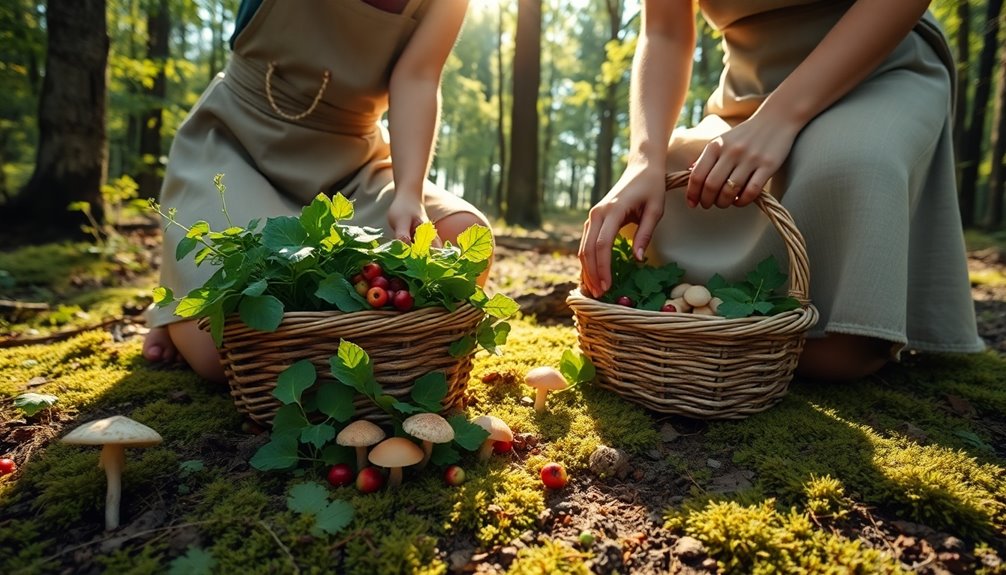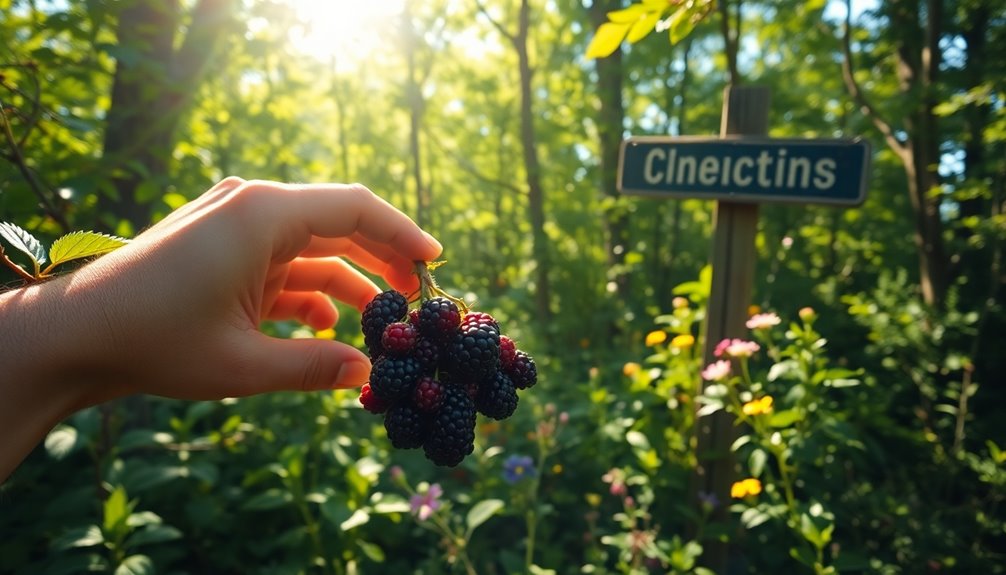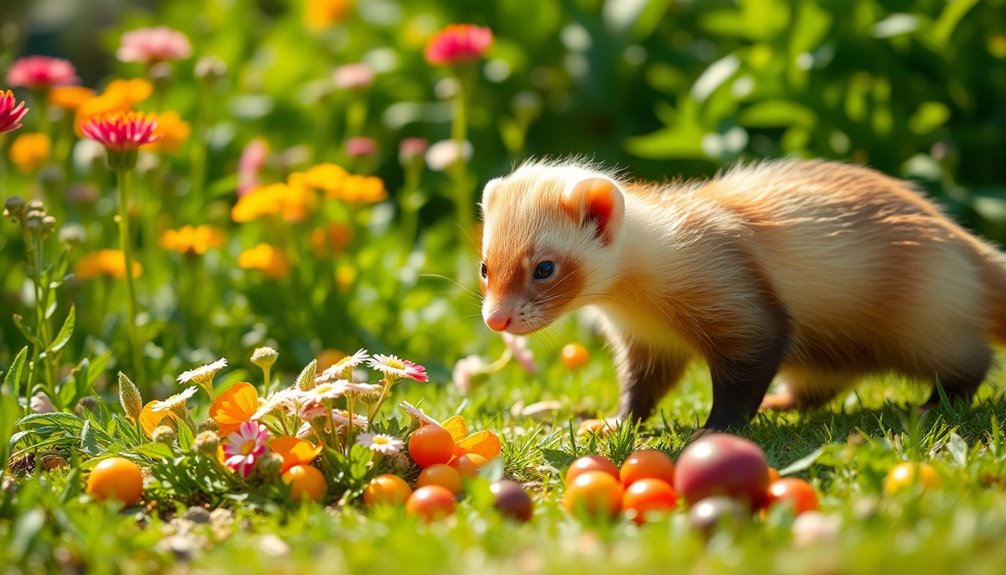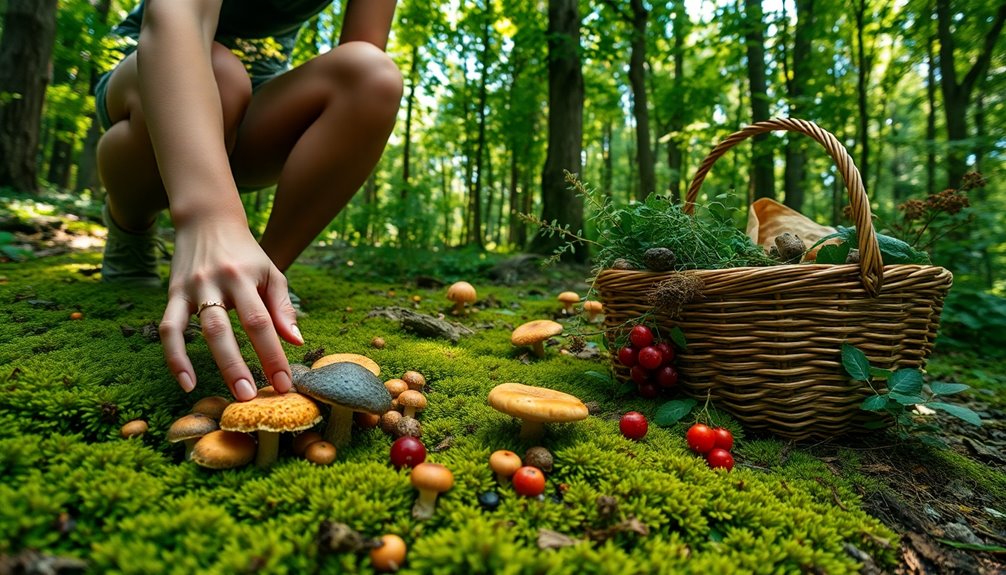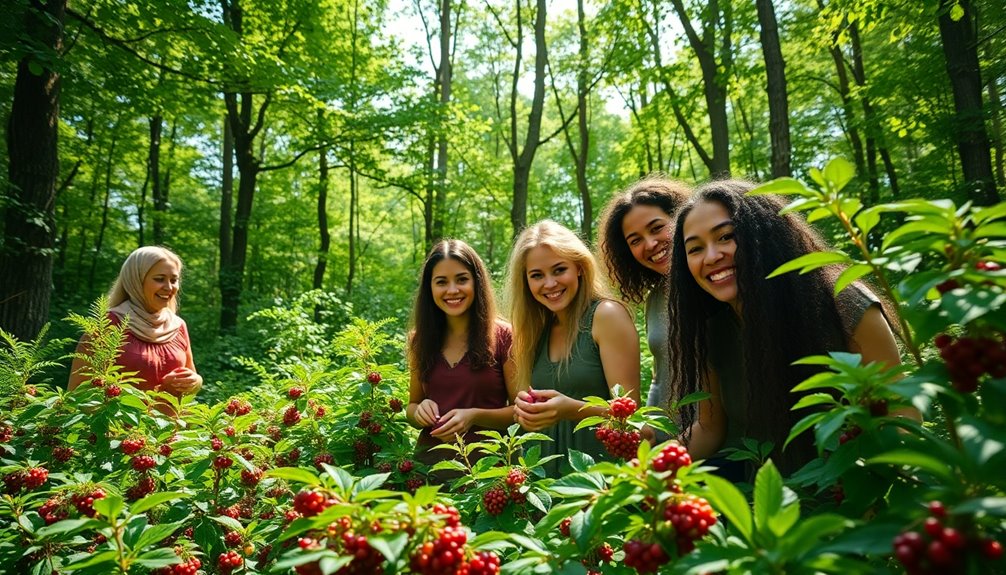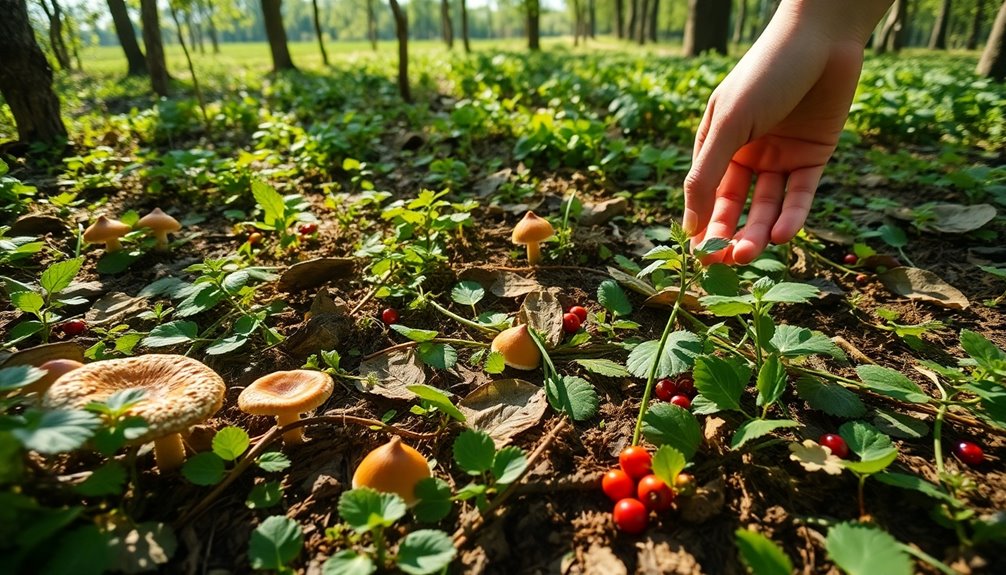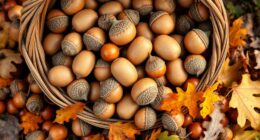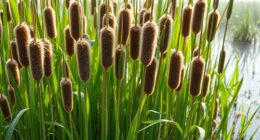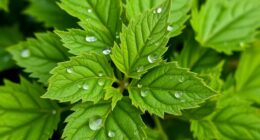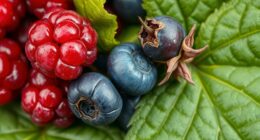Foraging is incredibly good for you, offering both health and happiness benefits that can enhance your life. You'll enjoy nutritious wild foods rich in vitamins and antioxidants that boost your immune system and improve digestion. The physical activity involved provides a natural workout, lifting your mood and reducing stress. Plus, being in nature fosters mindfulness, creating strong connections to your environment. As you explore new flavors, you'll experience culinary creativity that reflects the seasons. Engaging in foraging also supports local ecosystems and economies. If you're curious about how to get started and what else it can offer, there's more to discover!
Key Takeaways
- Foraging connects individuals to nature, promoting mindfulness and enhancing mental well-being through stress reduction and mood improvement.
- Wild plants often have superior nutritional profiles, providing essential vitamins, minerals, and antioxidants beneficial for overall health.
- The physical activity involved in foraging, such as walking and climbing, contributes to improved fitness and digestive health.
- Foraging fosters community bonds and creates social networks, enriching emotional support and shared experiences among participants.
- Engaging in foraging encourages sustainable practices and environmental awareness, promoting biodiversity and conservation efforts.
Historical Context of Foraging
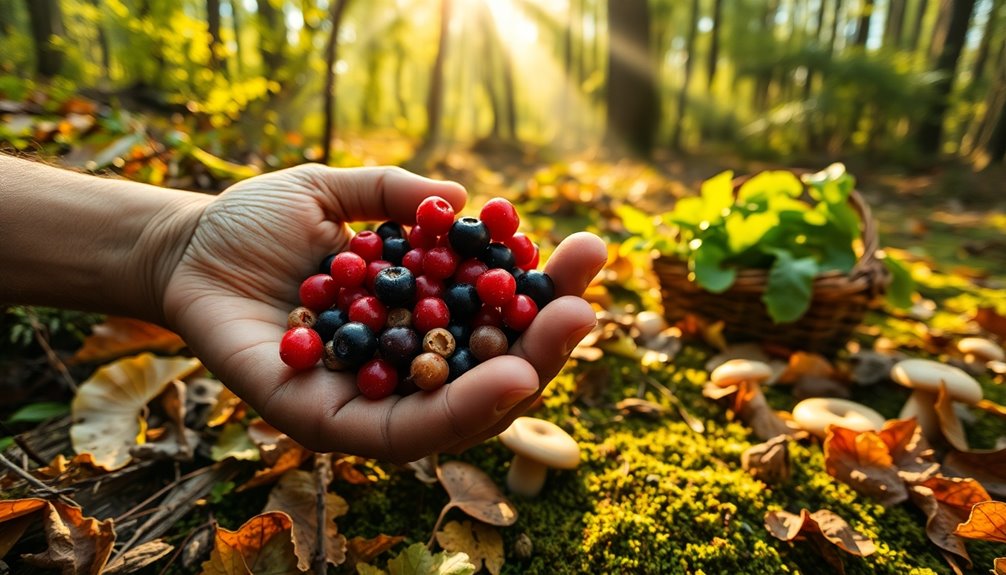
For thousands of years, foraging shaped human survival and health. It's been around for roughly two million years, stemming from our ancestors' reliance on hunting and gathering for sustenance. Unlike today's processed foods, foraging offered a diverse diet filled with wild food, promoting a healthy lifestyle and ideal physical health.
Historical studies, like one analyzing 14 skeletons from Bolivia dating back to 3,000-1,500 BC, revealed that foragers experienced fewer diseases and nutritional deficiencies compared to later agricultural societies. This suggests that their connection to the natural world was crucial not just for survival but for overall well-being.
Foraging communities thrived because they understood their local ecosystems, building a sustainable relationship with their environment.
As you explore foraging today, you tap into that ancient wisdom. It's not just about finding food; it's about engaging with nature and embracing a lifestyle that nurtures both body and mind.
Physical and Nutritional Benefits
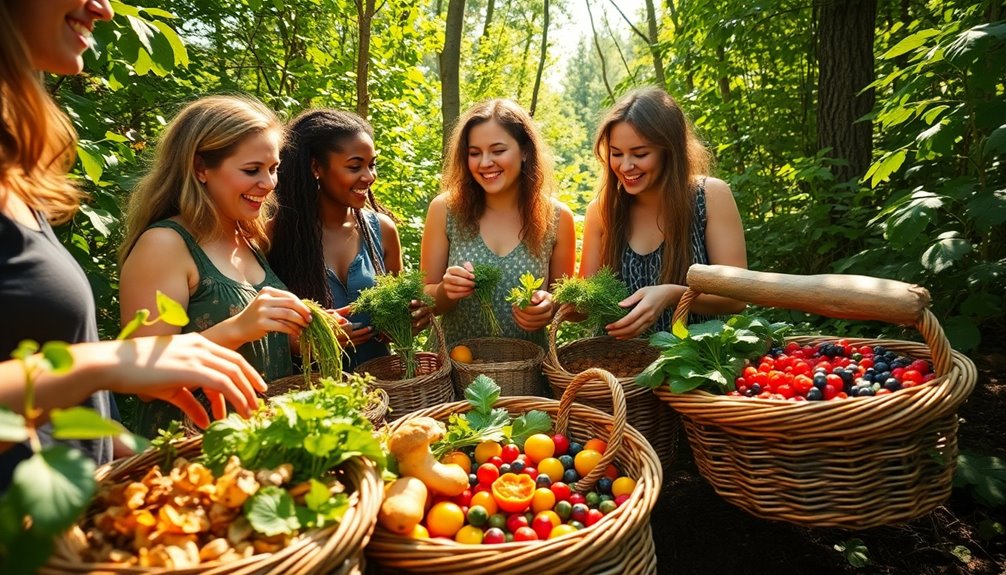
Exploring the world of foraged foods reveals a treasure trove of physical and nutritional benefits that can enhance your well-being. By incorporating wild plants into your diet, you can enjoy significant health benefits that cultivated crops often lack.
Consider these advantages:
- Higher Nutritional Value: Wild plants typically boast more vitamins, minerals, and antioxidants.
- Improved Digestive Health: Foraged foods are often rich in fiber, promoting better digestion.
- Physical Activity: Foraging involves walking, bending, and climbing, making it a great way to stay active.
- Support for Immune Health: Foods like rose hips are loaded with vitamin C and antioxidants, boosting your immune system naturally.
- Dietary Variety: Foraging introduces unique ingredients, adding exciting flavors and improving your overall nutrition.
Engaging in this practice not only nourishes your body but also encourages a healthy lifestyle. Additionally, these foraged foods can provide educational benefits as they invite exploration and learning about local ecosystems and biodiversity.
Psychological and Emotional Impact
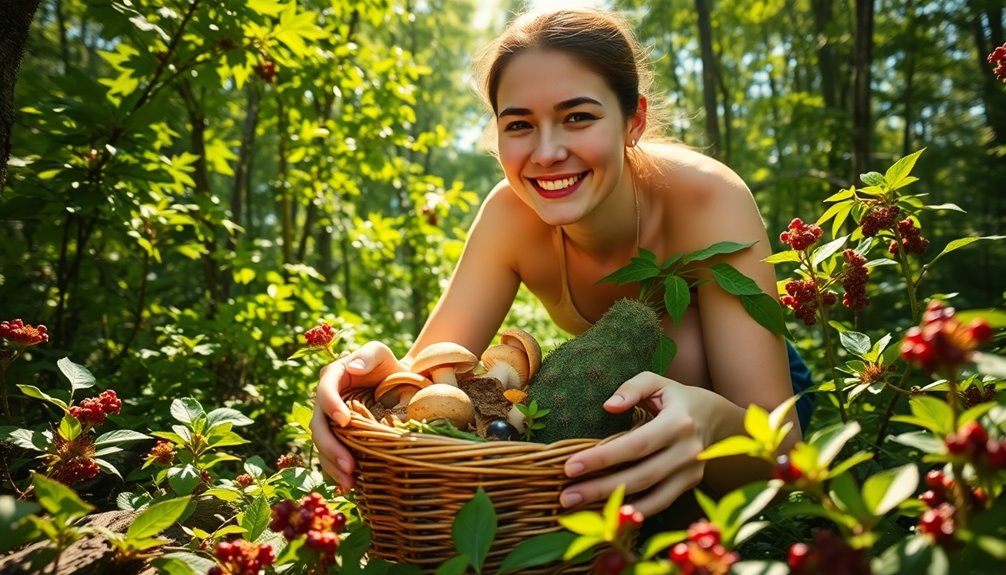
Incorporating foraged foods into your life not only brings physical and nutritional perks but also positively influences your psychological and emotional well-being. Foraging encourages mindfulness, allowing you to engage with nature in a way that fosters a deeper connection to your environment. This natural meditation enhances your overall mental health, helping you feel more grounded and present.
As you wander through the woods or fields, you might experience feelings of nostalgia and joy, which greatly contribute to your emotional health. The physical activity involved in foraging boosts your mood and reduces stress, further supporting your mental well-being. Additionally, just as aromatherapy can trigger the release of neurotransmitters like serotonin that enhance mood, foraging also stimulates positive feelings through the joy of discovery. Engaging with the natural world can also lead to an appreciation for sustainable farming practices, which reinforces a sense of responsibility toward the environment.
Plus, learning about local flora and understanding natural processes enriches your experience, providing a sense of accomplishment and fulfillment.
Foraging is also a social activity that strengthens community bonds. Sharing your experiences with friends or family not only enhances feelings of belonging but also creates a supportive network. This connection with others amplifies the joy of foraging, making it a rewarding practice that nurtures both your emotional health and mental resilience.
Embrace foraging, and you'll discover its profound impact on your overall happiness.
Culinary Creativity and Exploration
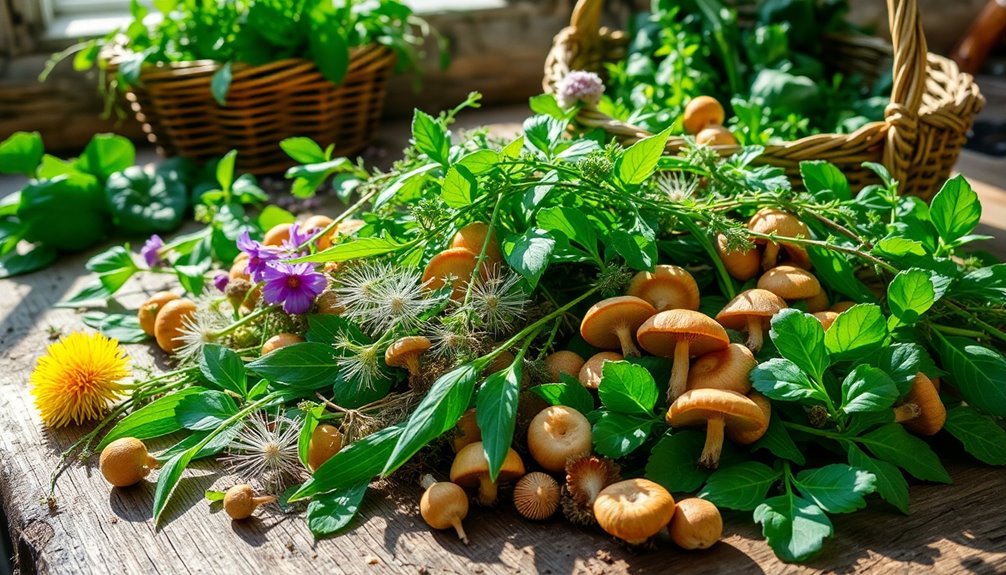
Diving into the world of foraging opens up a treasure trove of culinary creativity and exploration. As you venture into nature, you'll discover a variety of foraged ingredients, like edible flowers and wild greens, that can elevate your dishes.
This practice encourages culinary experimentation, allowing you to try new recipes that showcase the unique flavors of seasonal produce.
Here are some ways foraging can enhance your culinary journey:
- Discover new flavors: Incorporate wild ingredients like ramps and mushrooms to surprise your palate.
- Seasonal cooking: Use foraged items to create dishes that celebrate the changing seasons.
- Preserve your finds: Experiment with pickling or dehydrating foraged ingredients to enjoy them year-round.
- Improve your skills: Learn to identify and prepare unfamiliar ingredients, boosting your cooking abilities.
- Deepen your connection: Engaging in foraging helps you connect to food, understanding where it comes from and how to use it.
Environmental and Economic Advantages

Foraging offers significant environmental and economic advantages that can greatly benefit both individuals and communities. By supplementing your diet with free, wild ingredients, you can reduce grocery bills and save hundreds of dollars annually. For instance, foraged elderflower products can be valued at £200-300. This practice not only helps you save money but also minimizes reliance on expensive imported produce, promoting a more sustainable lifestyle.
Engaging in foraging supports local economies through community interaction. You might sell your foraged items or participate in workshops, fostering connections that benefit everyone involved. These interactions can boost local businesses while enhancing your health and well-being.
Moreover, foraging encourages biodiversity by supporting native plant populations. When you collect wild foods responsibly, you help preserve local ecosystems and reduce your ecological footprint. This awareness of local flora promotes sustainable harvesting techniques, contributing to environmental conservation efforts.
Frequently Asked Questions
What Are the Health Benefits of Foraging?
Foraging offers several health benefits that you shouldn't overlook. You get access to nutrient-rich foods, often packed with vitamins and minerals.
As you explore nature, you'll engage in physical activity, which helps meet exercise recommendations. Gathering wild plants can enhance your diet, boosting your gut health due to increased fiber.
Plus, spending time outdoors reduces stress, uplifts your mood, and supports overall mental well-being—making foraging a rewarding experience for both body and mind.
What Are the Disadvantages of Foraging?
Imagine wandering through a dense forest, searching for wild edibles, but you risk misidentifying a toxic mushroom. Foraging's not just about adventure; it can be dangerous.
You need extensive knowledge to avoid poisonous plants, and legal restrictions might limit where you can forage. Plus, pollution can taint your finds, and seasonal changes could leave you empty-handed.
If you're inexperienced, these pitfalls can make foraging a gamble instead of a rewarding experience.
What Is the Golden Rule of Foraging?
The golden rule of foraging is simple: "leave no trace."
When you forage, only take what you need and guarantee you don't harm the environment or the plant populations. Respect local wildlife and follow sustainable practices.
Always be aware of the legal regulations in your area, especially if you're on private land.
Is Foraging Good or Bad?
Did you know that foraging can increase your vitamin intake by up to 50% compared to store-bought produce?
When you ask if foraging is good or bad, consider the benefits. It's a fantastic way to connect with nature, boost your physical fitness, and enhance your mental well-being.
You'll find that the fresh, wild foods you gather can nourish both your body and mind, making foraging a worthwhile and enriching experience.
Conclusion
So, you've decided to embrace foraging, huh? Who needs grocery stores when you can play jungle explorer in your backyard? Sure, you'll get your daily dose of nutrients and a side of wild adventure, but let's not forget the thrill of dodging poison ivy and the occasional run-in with a territorial squirrel. It's a recipe for health, happiness, and a dash of chaos. So grab that basket and channel your inner caveman—adventure awaits, just watch your step!

